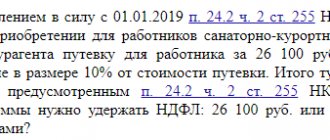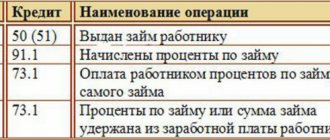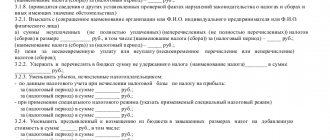In what cases does Article 100 of the Tax Code of the Russian Federation oblige tax authorities to draw up an audit report?
The report is always the result of an on-site tax audit (VNA) and is drawn up regardless of whether violations are found or not (see letter of the Federal Tax Service of Russia dated April 16, 2009 No. ШТ-22-2/299).
Based on the results of a desk tax audit (CTA), an act is drawn up only if during the audit, violations of the legislation on taxes and fees were identified.
If the outcome of the CNI is positive, the inspectorate is not obliged to inform the taxpayer about its completion (letter of the Federal Tax Service of Russia for Moscow dated May 21, 2009 No. 20-14/4/051403). An exception is checking the VAT return using the application procedure for tax refund. The inspection must report its completion without violations within 7 days after completion (Clause 12, Article 176.1 of the Tax Code of the Russian Federation).
For more information about the application procedure for refund, read the article “Features and terms for the general and application procedure for VAT refund.”
Can the payer be present at the review of materials?
The taxpayer is required to send a notice indicating the date and place of consideration of the materials. If this notice is not sent, the company will be able to easily challenge its liability. Essentially, this document allows you to call the payer to an event.
If the payer who received the notice does not appear at the meeting, it is held without his participation. However, the manager has the right to postpone consideration of materials if the participation of the taxpayer is mandatory.
Preparation of a power of attorney
Who exactly should appear at the meeting? It is not necessary for the head of the company to do this. Moreover, this is not even advisable for the following reasons:
- The manager usually does not understand accounting and calculation of taxes.
- Due to a lack of knowledge, a manager is unlikely to be able to answer all questions correctly.
You can send an accountant to the meeting. In this case, a power of attorney is drawn up for him.
If the KNP act has not been drawn up, how can you find out about its completion?
If 3 months have passed from the date of filing the declaration, and the inspection has not asked you for documents or explanations, or demanded that you make corrections to the reporting, consider that the desk audit ended successfully.
If you need accurate information, contact the Federal Tax Service with a request to inform you about the results of the KNI. The fact that tax officials do not have this obligation does not give them the right to ignore the taxpayer’s request (see, for example, Resolution of the Federal Antimonopoly Service of the Volga District dated February 18, 2009 No. A55-10190/2008).
Deadlines for compilation, to whom it is handed over
If we talk about the procedure itself, it can last no more than 2 months - in practice, it takes no more than a few days.
The report must be drawn up no later than two months after the end of the inspection.
As for clarifications and objections, they must be formed within the next month.
There are situations when the verification may be extended. This includes:
- translation of papers or examination;
- situations when information from foreign companies is needed.
However, even if we take into account the above-mentioned cases, the inspection cannot last longer than six months. Moreover, this period is fixed at the level of law. On the day when the control is completed, the authorized employee of the organization is issued a special certificate.
As for the frequency of inspections, if we are talking about unscheduled inspections, they are performed in the following cases:
- if a previously issued prescription has expired;
- if the organization received a complaint from citizens.
If we talk about a scheduled inspection, then it can be carried out no more often than once every three years.
If this deadline was violated, then the entrepreneur has every right not to provide tax documents and production premises for inspection. In addition, the inspection is obliged to notify the entrepreneur three days before the start of the procedure of its arrival. After the signed act is certified by the persons who performed the audit, it is handed over to the taxpayer who was audited. If the latter refuses to take the document, then appropriate notes are made on it.
Within what time frame must the inspection department draw up and submit an inspection report?
The inspectorate must prepare an on-site inspection report within 2 months from the date of drawing up the certificate of the inspection, and if a consolidated group of taxpayers was inspected, within 3 months.
For drawing up a desk inspection report, Art. 100 of the Tax Code of the Russian Federation allocates 10 days from the date of completion of the CNI.
The inspectors must hand over the report to the taxpayer within 5 days from the date of preparation.
ConsultantPlus experts spoke about the consequences of failure to deliver a tax audit report. If you don't have access to the system, get a free trial online.
Circumstances taken into account at the meeting
As already mentioned, additional circumstances may influence the decision to impose liability. They can both mitigate and aggravate the taxpayer’s guilt. The list of circumstances is given in Articles 111 and 112 of the Tax Code of the Russian Federation. Let's consider mitigating factors (Article 112 of the Tax Code of the Russian Federation):
- A disorder caused by difficult personal or family conditions.
- A crime committed under the influence of threats or coercion. For example, this could be coercion related to financial or job responsibility.
- Other circumstances recognized by the court or tax authorities.
An aggravating circumstance is the commission of a similar violation earlier.
What happens if the deadline for delivery of the act is missed?
Nothing. It will not be possible to use the tax authorities’ violation of the deadline for delivering the audit report to turn its results in their favor. In itself, the delay in delivery of the act is not a basis for canceling the decision on the inspection, since it does not relate to significant violations of the procedure for considering its materials (clause 14 of Article 101 of the Tax Code of the Russian Federation).
This is also confirmed by the courts (see the resolution of the 9th Arbitration Court of Appeal dated December 16, 2013 No. 09AP-40446/2013 in case No. A40-76732/13, which was upheld by the resolution of the Federal Antimonopoly Service of the Moscow District dated April 9, 2014 No. F05-2601/ 2014).
Appealing the decision
The commission's decision does not immediately enter into legal force. The payer is given a period to appeal. It is a month. Challenging is carried out on appeal. To appeal, you can send a complaint through the structure that made the decision. Partial satisfaction of the taxpayer's objections is possible. The decision may also be reversed.
If the appeal is rejected, the payer can send a statement of claim to the court. The claim is filed in court located at the address of the body that made the decision.
To increase the chances of a successful consideration of the claim, you need to draft it correctly. The line of defense may involve pointing out procedural violations and violating the rights of the taxpayer. For example, if the check was carried out with errors, you can point them out. The decision is also canceled if the individual is held liable for the violation.
Who signs the inspection report?
The act must be signed by 2 parties: the Federal Tax Service employees who conducted the inspection, as well as the person being inspected or his representative.
Note that sometimes tax officials violate the procedure for signing the act. For example, it can be endorsed by an employee who was not indicated in the decision to conduct a GNP and did not participate in it. Or vice versa, the act will not contain the signature of one of those who carried out the inspection.
Neither one nor the other will most likely affect the outcome of the audit and will not help challenge its results. This is evidenced by arbitration practice (see, for example, resolutions of the Presidium of the Supreme Arbitration Court of the Russian Federation dated January 24, 2012 No. 12181/11, FAS Moscow District dated June 27, 2014 No. F05-6192/2014 in case No. A40-188140/13, FAS West Siberian District dated September 12, 2013 in case No. A81-2308/2012, etc.).
What information should be included in the inspection report?
The requirements for the content of the inspection report are established in paragraph 3 of Art. 100 Tax Code of the Russian Federation. So, it states:
- date of the act (date of its signing by the inspectors);
- full and abbreviated name or last name, first name and patronymic of the person being inspected; if a separate unit was checked, its full and abbreviated name, as well as its location, are additionally indicated;
- last names, first names and patronymics of the persons conducting the audit, their positions, indicating the name of the tax authority they represent;
- date and number of the decision to conduct an on-site inspection (for VNP) or date of submission of the declaration and other documents (for KNP);
- a list of documents submitted during the inspection by the person being inspected;
- the period for which the inspection was carried out;
- name of the tax verified;
- start and end dates of the audit;
- address of the location of the organization (members of the consolidated group of taxpayers) or place of residence of the individual;
- information about tax control measures carried out during the audit;
- documented facts of tax offenses, if they have been identified, or a record of the absence of such;
- conclusions and proposals of inspectors to eliminate identified violations, substantiated by references to the norms of the Tax Code of the Russian Federation.
Currently, the form of the inspection report and the requirements for its preparation are used, approved by order of the Federal Tax Service of Russia dated November 7, 2018 No. ММВ-7-2/ [email protected]
If you have access to ConsultantPlus, check whether all requirements for the tax audit report are met. If you don't have access, get a free trial of online legal access.
More information about the acts of GNP and KNP can be found on our website in the articles:
- “On-site tax audit report—sample and features”;
- “Desk tax audit report—sample”.
Procedure for registering the results of tax audits
Each on-site tax audit ends with additional assessments. Arrears, penalties and fines can also be identified based on the results of a desk audit. An interview with Sergei Razgulin, 3rd Class Actual State Advisor of the Russian Federation, is devoted to issues related to the timing and procedure for processing the results of tax audits, including additional tax control measures.
What document is drawn up upon completion of an on-site tax audit?
On the last day of the tax audit, the inspector (the head of the audit team) is obliged to draw up a certificate of the audit carried out (clause 15 of Article 89 of the Tax Code of the Russian Federation). The certificate records the subject of the inspection and the timing of its implementation. The start date of the audit is the date of the decision to conduct an on-site (repeated on-site) tax audit. The end date of the inspection is the date of preparation of the specified certificate. The certificate separately stipulates the timing of suspension or extension of the inspection.
The form of the certificate is given in Appendix No. 7 to the Order of the Federal Tax Service of Russia dated May 8, 2015 No. ММВ-7-2/ [email protected] With the preparation of the certificate, the on-site tax audit ends.
The certificate is given to the taxpayer. If at the time of drawing up the certificate the inspectors are no longer on the taxpayer’s territory and the taxpayer ignored the notice to appear at the tax authority to receive the certificate, then it is sent to the taxpayer by registered mail.
When should an on-site tax audit report be drawn up?
The act is drawn up no later than two months after drawing up a certificate of the inspection. The form of the act drawn up based on the results of tax audits must comply with Appendix No. 23 to Order of the Federal Tax Service of Russia dated 05/08/2015 No. ММВ-7-2/ [email protected]
If an on-site audit of an organization included inspections of its branches and representative offices, then sections of the act based on the results of the tax audit of the branch (representative office) are drawn up before the actual act.
The report on the results of the tax audit is drawn up taking into account the sections of the audit report of branches and representative offices.
The sections of the inspection report of branches (representative offices), signed by the inspectors and the representative of the branch (representative office), remain in storage with the tax authority.
Can the act be signed by a tax authority official who did not participate in the audit?
Maybe. According to Resolution of the Presidium of the Supreme Arbitration Court of the Russian Federation dated January 24, 2012 No. 12181/11, the mere fact of signing a tax audit report by a person who did not conduct the audit does not indicate a significant violation of the rights of the taxpayer being audited. The taxpayer must justify what the violation of his rights was (this may, in particular, be obstacles to the right to file objections or provide explanations).
Another situation occurs when a tax audit report, for example, due to the absence of a tax official from the workplace, is signed for him by another official. A document signed with a falsified signature is not adequate evidence and cannot form the basis of a decision to hold the taxpayer liable for taxation. Regardless of whether this led or did not lead to the adoption of an essentially incorrect decision (Resolution of the Volga District Autonomous District of April 29, 2015 No. F06-23225/2015).
What are the deadlines for drawing up a report based on the results of a desk audit?
Article 88 of the Tax Code of the Russian Federation allows 3 months from the date the taxpayer submits a tax return (calculation) for a desk audit.
As a general rule, the preparation of a certificate of a desk audit of the Tax Code of the Russian Federation is not provided.
A desk tax audit of a VAT and excise tax return has some features. Upon completion of the inspection of the declaration in which tax amounts are claimed for reimbursement, the tax authority is obliged to make a decision on reimbursement within seven days, if no violations of the legislation on taxes and fees have been identified (Articles 176 and 203 of the Tax Code of the Russian Federation).
When conducting a desk audit of VAT refunds on an application basis, excise tax refunds to persons specified in paragraph 1 of Article 203.1 of the Tax Code of the Russian Federation (in particular, those who have a certificate for processing straight-run gasoline), it is provided, in appropriate cases, for the tax authority to send a message to the taxpayer about the completion of the tax audit and about the absence of identified violations of the legislation on taxes and fees (clause 12 of article 176.1, clause 9 of article 203.1 of the Tax Code of the Russian Federation). A desk tax audit report is drawn up if violations of the legislation on taxes and fees are detected within 10 working days after the end of the desk audit.
How is the deed transferred to the taxpayer?
The report based on the results of the desk and field audit within 5 days from the date of signing is handed over to the taxpayer against receipt or transferred in another way indicating the date of its receipt by the taxpayer.
The report is drawn up after the inspection is completed. Since the inspectors are no longer located on the taxpayer’s territory, delivery of the on-site inspection report against signature can only be achieved by calling the taxpayer to the tax authority to receive the report. If for some reason the taxpayer does not appear to receive the act, then the act must be sent to the taxpayer by registered mail within the same five days from the date of this act. In this case, paragraph 5 of Article 100 of the Tax Code of the Russian Federation does not provide for any other method of delivering the act.
Will it be considered a violation if the document is delivered late?
In practice, there are cases of delivery of an act later than the deadline established by paragraph 5 of Article 100 of the Tax Code of the Russian Federation (letter of the Federal Tax Service of Russia dated December 8, 2017 No. ED-4-15 / [ email protected] ).
This is not considered a significant violation of the terms of the procedure for considering tax audit materials. But provided that the taxpayer was promptly informed of the date, time and place of consideration of the audit materials.
How much time is given to the taxpayer to prepare objections to the act?
One month from the date of receipt of the act. It is during this period, in accordance with paragraph 6 of Article 100 of the Tax Code of the Russian Federation, that the person in respect of whom a tax audit was carried out, in case of disagreement with the facts set out in the act, as well as with the conclusions and proposals of the inspectors, has the right to submit written objections to the tax authority in general or on individual provisions of the act.
Before the expiration of the one-month period, in other words, during the period allotted for submitting written objections, a decision on the tax audit materials is not made (letter of the Ministry of Finance of Russia dated July 15, 2010 No. 03-02-07/1-331).
When sending objections by mail, you should make sure that they are received in a timely manner by the tax authority, especially if the taxpayer does not intend to directly participate in the consideration of the materials.
If a person submits objections, explanations, petitions and their receipt by the tax authority up to and including the date of consideration of the audit materials, these materials are also considered and taken into account by the head (deputy head) of the tax authority when making a decision (letter of the Federal Tax Service of Russia dated 08/07/2013 No. SA- 4-9/ [email protected] ).
And if the taxpayer does not have time to submit written objections within a month...
You should notify the inspectorate of your intention to submit written objections and ask, for valid reasons, to postpone the consideration of the inspection materials to a later date. Missing the deadline for submitting written objections does not prevent the taxpayer from taking part in the consideration of the audit materials and giving his explanations, including in writing.
What is the period for reviewing and making a decision on tax audit materials?
The time frame for making a decision depends on whether the tax authority will appoint additional tax control measures. In addition, the deadline for making a decision may be extended by one month.
The maximum period for making a decision is the sum of the following terms: - 10 working days for consideration of inspection materials (the period is calculated after the expiration of the one-month period for filing objections); — one month (two months when checking a consolidated group of taxpayers) to carry out additional tax control measures; — 10 working days for consideration of the audit materials, taking into account the materials of additional tax control measures (the period is calculated from the date of expiration of the deadline for submitting objections to the materials of additional measures); — one month, by which the period for consideration of tax audit materials and additional tax control measures may be extended.
Making a decision to extend the period for consideration of tax audit materials after additional measures is carried out is possible if the total period for extending the consideration of tax audit materials (before making a decision to carry out additional measures and after making a decision to carry out additional measures) does not exceed one month (letter from the Federal Tax Service of Russia dated 07/13/2016 No. AS-4-7/ [email protected] ).
What does it mean that the tax authority appoints additional tax control measures?
When considering the materials of a tax audit, the tax authority has the right to make a decision on carrying out additional tax control measures.
Additional measures may be assigned when reviewing the materials of the desk audit. The period for conducting them should not exceed one month (two months when auditing a consolidated group of taxpayers). This period is not included in the period allotted for making a decision on the inspection.
Additional tax control measures include interrogation of a witness, examination, and request for documents. The number of these additional measures is not limited (letter of the Ministry of Finance of Russia dated July 15, 2016 No. 03-02-07/1/41426).
Other activities, such as inspections, cannot be carried out.
Tax control measures selected by the tax authority for implementation are listed in the decision, the form of which is contained in Appendix No. 29 to Order of the Federal Tax Service of Russia dated 05/08/2015 No. ММВ-7-2/ [email protected]
Within the meaning of the provisions of paragraph 6 of Article 101 of the Tax Code of the Russian Federation, the specific form of additional measures provides that in the decision it is not enough to simply list the forms of their implementation permitted by the Tax Code of the Russian Federation, but should indicate specific persons from whom documents will be requested, persons from whom witness testimony will be received, and also determine the name (subject) of the examination.
Are there any specific requirements for requesting documents during additional measures?
With a literal interpretation of Articles 93 and 93.1 of the Tax Code of the Russian Federation, the tax authority has the right to demand from the taxpayer being inspected only documents about a specific transaction. Documents can be demanded in full from the counterparty of the taxpayer being inspected, since such a basis for requesting documents as carrying out additional measures is directly mentioned in Article 93.1 of the Tax Code of the Russian Federation.
But there is a practice according to which the request for primary accounting documents from the person being inspected as an additional tax control measure is permissible, provided that the tax authority had grounds for requesting them during the tax audit itself (Resolution of the Presidium of the Supreme Arbitration Court of the Russian Federation dated March 15, 2012 No. 14951/11) .
How are the results of additional measures documented?
The Tax Code of the Russian Federation does not provide for the registration of the results of additional tax control measures as a separate document.
How does a taxpayer become familiar with the results of additional measures?
The taxpayer has the right to submit an application to familiarize himself with the audit materials and materials of additional tax control measures. Without such an appeal, the tax authority is not obliged to provide materials to the taxpayer (clause 2 of Article 101 of the Tax Code of the Russian Federation).
It is possible to recommend that the taxpayer in any case use the right to familiarize himself with the audit materials and materials of additional tax control measures. It is necessary to submit a written application to the tax authority with a request for familiarization within the period established for submitting objections to the audit report or to the results of additional tax control measures, namely within one month or 10 working days (clause 6 of Article 100, clause 6.1 of Article 101 Tax Code of the Russian Federation).
The application form is optional.
Familiarization with the audit materials is organized on the territory of the tax authority no later than 2 days from the date of filing the specified application. The Tax Code of the Russian Federation establishes methods of familiarization: inspection of documents, making extracts, making copies.
The fact of familiarization is confirmed by a protocol drawn up in accordance with Article 99 of the Tax Code of the Russian Federation.
Should the act be accompanied by documents received by the tax authority during control activities?
Along with the report, the taxpayer must be given attachments: documents confirming the facts of identified violations of the legislation on taxes and fees, and other materials, if available. The Tax Code of the Russian Federation contains a clause stating that documents received from the person in respect of whom the tax audit was carried out are not attached to the act.
According to the Federal Tax Service, the Tax Code does not provide the taxpayer with the right to familiarize themselves with audit materials that are not reflected in the audit report (letter No. ED-4-2/23295 dated November 16, 2017). That is, with those materials that, although the tax authority has, do not confirm the facts of violations.
It seems that the requirement to attach documents confirming violations of the law to the report is a way to exercise the taxpayer’s right to submit objections to these documents. But paragraph 3.1 of Article 100 of the Tax Code of the Russian Federation should not be considered as limiting the taxpayer’s right to access information that confirms his case. In this regard, the presentation of all verification documents (extracts from documents containing secrets protected by law) as appendices to the act is more consistent with the meaning of the norms of the Tax Code of the Russian Federation and the requirements of objectivity and validity for the preparation of the act.
How long does it take to familiarize yourself with the audit materials?
The duration of familiarization with the Tax Code of the Russian Federation has not been established. But according to its purpose as a procedure preceding the consideration of audit materials by the head (deputy) head of the tax authority, familiarization must be completed within the period allotted for the submission of objections to these materials.
Within what period can I file objections to the results of additional measures?
Within 10 working days from the date of expiration. The duration of this period does not depend on whether the taxpayer submitted an application to familiarize himself with the materials or not.
Before the expiration of this period, a decision based on the results of reviewing the audit materials in a situation where additional tax control measures were carried out is not made. Let me remind you that the period for carrying out additional measures, as a general rule, is one month and is indicated in the relevant decision.
Let's assume that additional activities ended on March 20, 2021. On March 21, 2021, the taxpayer submitted an application to familiarize himself with the materials received by the tax authority. The tax authority must ensure familiarization no later than March 23, 2021. Objections may be submitted by the taxpayer no later than April 3, 2018.
Therefore, on the one hand, failure to submit an application for familiarization with the materials essentially deprives the taxpayer of the opportunity to submit objections to them in a separate procedure.
On the other hand, if for some reason the taxpayer did not take the initiative to submit an application, he will be able to gain access to the materials of additional tax control measures by participating in the consideration of the audit materials by the tax authority and submitting explanations at this stage (clause 4 of Article 101 of the Tax Code of the Russian Federation ).
Could the situation of the taxpayer under audit worsen as a result of additional measures?
Additional measures can only be taken in relation to violations of tax legislation already established in the act. They are not intended to collect information about violations that are not reflected in the inspection report (clause 39 of the Resolution of the Plenum of the Supreme Arbitration Court of the Russian Federation dated July 30, 2013 No. 57). Thus, the taxpayer cannot be held liable for offenses not specified in the audit report.
But if violations were identified during a tax audit and reflected in the audit report, then, based on the results of additional tax control measures, the inspectorate has the right to adjust the taxpayer’s tax obligations for identified violations upward (to establish non-payment of tax in a larger amount than was reflected in the audit report) .
This conclusion was made in the Ruling of the Supreme Court of the Russian Federation dated August 20, 2015 No. 309-KG15-9617.
Should a taxpayer participate in the consideration of audit materials by the tax authority?
Not necessary.
The procedure for making a decision based on the results of consideration of tax audit materials is regulated by Article 101 of the Tax Code of the Russian Federation. Before considering the materials of a tax audit on its merits, the head (deputy head) of the tax authority establishes the fact of the appearance of persons duly notified of the time and place of the examination.
If the person subject to the tax audit fails to appear, the tax audit materials may be considered in his absence, or the tax authority decides to postpone the consideration. In this case, a new date for consideration is set, of which the tax authority is obliged to notify the taxpayer.
Despite the fact that, in the opinion of the tax authority, the participation of the taxpayer in the consideration of tax audit materials in a particular case is “mandatory”, such participation remains the right of the taxpayer (subparagraph 15 of paragraph 1 of Article 21 of the Tax Code of the Russian Federation).
What if the taxpayer was not notified of the consideration of the audit materials, including materials obtained during additional measures?
Regardless of the submission or failure to submit objections, the taxpayer must be notified of the date, time and place of each case of consideration of audit materials (clause 2 of Article 101 of the Tax Code of the Russian Federation). Failure to provide the opportunity to participate in the process of considering tax audit materials is a violation of the essential conditions of the procedure established by the Tax Code (clause 14 of Article 101 of the Tax Code of the Russian Federation).
But please note that paragraph 5 of Article 140 of the Tax Code of the Russian Federation allows the higher tax authority, on the basis of an appeal from the taxpayer, to eliminate such a violation by canceling the decision made during the audit. At the same time, a new decision will be made based on the results of consideration with the participation of the taxpayer of all audit materials and additional documents presented during the appeal.
Is the tax authority obliged to make a decision directly on the day of consideration of the audit materials?
There is no such obligation. The tax authority is not obliged to make a decision directly on the day of consideration of the audit materials (Resolution of the Presidium of the Supreme Arbitration Court of the Russian Federation dated March 17, 2009 No. 14645/08). Moreover, notification of the time and place of signing the decision is not provided - the taxpayer will receive an already signed decision.
Does the review of the audit materials end with a decision?
Yes, by a decision to prosecute or a decision to refuse to prosecute for committing a tax offense. From the moment the decision is made, the expiration of the three-year limitation period for bringing to responsibility is determined (Article 113 of the Tax Code of the Russian Federation).
Who should sign the decision?
The decision must be signed by the tax official who took part in the consideration of the audit materials. The forms of the decision to bring to justice for committing a tax offense and to refuse to bring to justice for committing a tax offense are given respectively in Appendices No. 30 and 31 to the Order of the Federal Tax Service of Russia dated 05/08/2015 No. ММВ-7-2/ [email protected]
When considering tax audit materials, a protocol is drawn up - this requirement is enshrined in paragraph 4 of Article 101 of the Tax Code of the Russian Federation. The protocol shall indicate, including full name. and the position of the person reviewing the materials, full name. and positions of persons participating in the consideration by the tax authority.
The taxpayer has the right to request a copy of the protocol.
If additional measures have been prescribed, then both the inspection materials and the additional measures must be reviewed by the person who subsequently signs the decision. Review of the audit materials by one official of the tax authority, despite the fact that the consideration of materials of additional tax control measures and the making of a decision was carried out by another person, may lead to the invalidation of the audit decision (letter of the Federal Tax Service of Russia dated March 11, 2016 No. ED-4-2 / [email protected ] ).
Paragraph 1 of Article 101 of the Tax Code of the Russian Federation directly stipulates that the materials of the audit and materials of additional tax control measures (if they are carried out) are considered by the same head (deputy head) of the tax authority that conducted the audit. Signing of a decision by the head (deputy head) of a tax authority who did not participate in the consideration of the audit materials (participated in the consideration of only part of the materials) is a violation of the essential conditions of the procedure for considering the audit materials and grounds for canceling the decision. It is believed that in such a situation the taxpayer was not provided with the opportunity to participate in the consideration of the audit materials and provide explanations (Resolution of the Presidium of the Supreme Arbitration Court of the Russian Federation dated September 29, 2010 No. 4903/10).
And if the attachments to the decision are not signed by the person who signed the decision, can this lead to the cancellation of the decision?
The appendices to the decision, as a rule, reflect the distribution of tax amounts between budgets and the calculation of penalties, but actual data that influences the calculation of arrears can be provided.
If the decision to bring to tax liability was signed by the head (deputy head) of the tax authority who reviewed the tax audit materials and the said decision of the tax authority was made in accordance with the Tax Code of the Russian Federation, then the fact that the annexes to the decision of the tax authority were signed by another person or the head (deputy head) did not sign them tax authority is not a violation of the terms of the procedure for considering tax audit materials. Thus, this in itself does not violate the rights and legitimate interests of the taxpayer (Decision of the Supreme Court of the Russian Federation dated March 13, 2015 No. 301-KG15-2264).
tax reporting tax audit
Send
Stammer
Tweet
Share
Share







